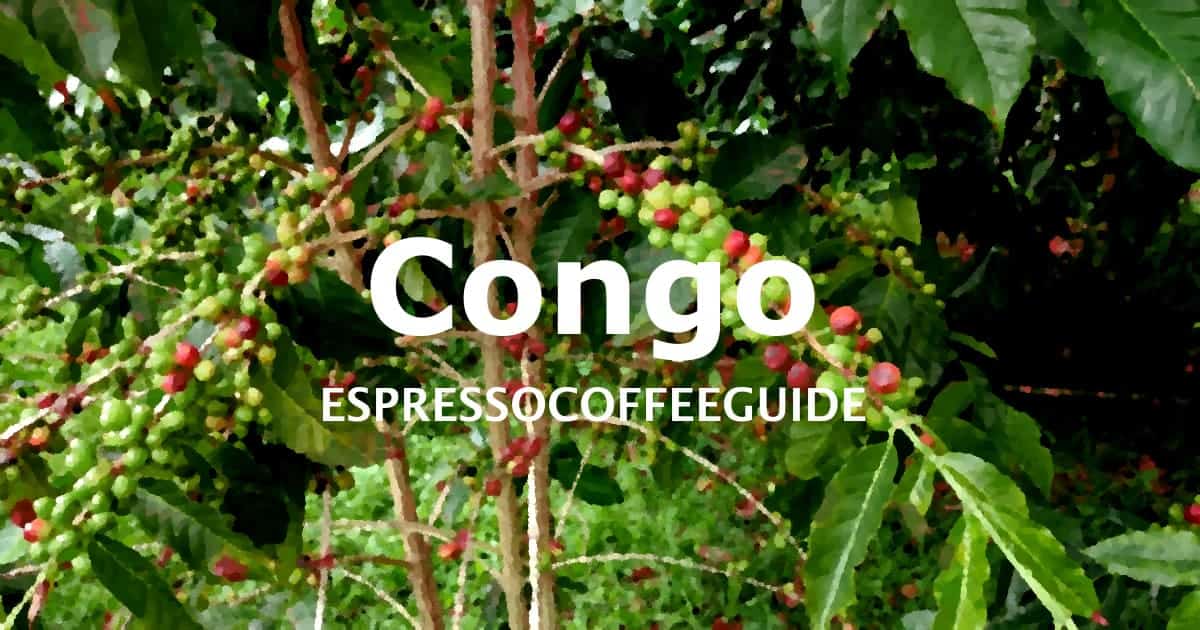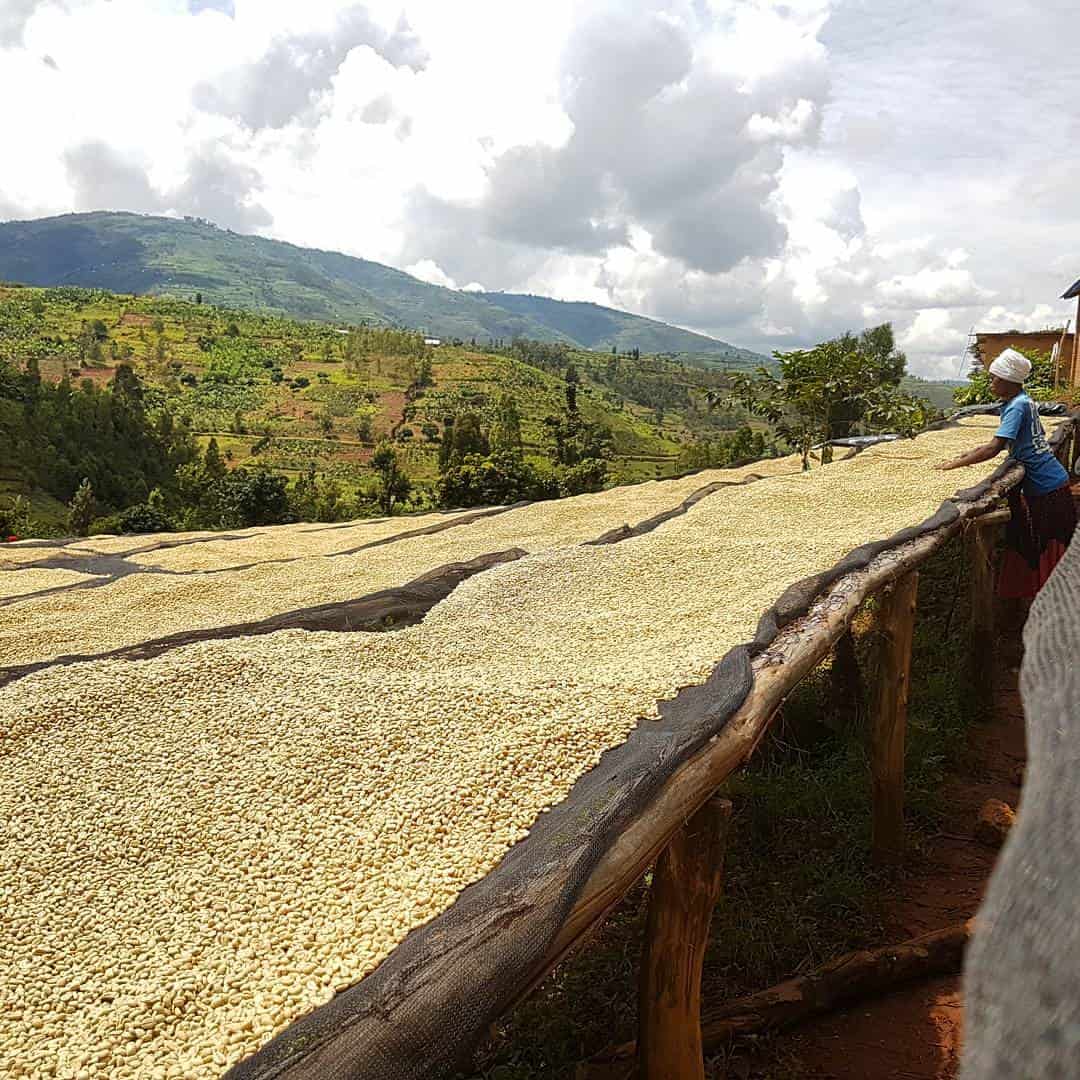Political and social turmoil in Congo has had negative effects on coffee farming, and the future of coffee farming in the region as well as the availability of premium quality exports remains uncertain.

Issues with both police and border agents mean delays and additional costs - sometimes in the form of bribes - to keep the flow of market-ready coffee to borders where it can be exported.
While neighbouring countries like Uganda can get coffee out in 10-14 days, it typically takes closer to 45 days for coffee from Congo to the port of Mombasa in Kenya.
- Growing Altitude: 1400-2000 meters above sea level
- Region: Kivu
- Arabica Variety: Bourbon
- Harvest Period: March – June
- Milling Process: Washed, Sun Dried
- Aroma: Sweet, Chocolatey
- Flavor: Citrusy, Dark Fruits (berries, raisins, plums)
- Body: Full
- Acidity: Bright, Citric
Companies such as Higher Grounds Trading Co. have invested both money into developing the local infastructure, and time and effort into importing and selling Congolese coffees in the United States and Canada. Congo is still a fairly exotic coffee growing region, without too much availability on the general market.
Jump to:
Growing regions
Kivu spans over a broad area and borders Rwanda, Burundi, and Uganda. The three provinces of Kivu are Maniema, Sud-Kivu (South Kivu), and Nord-Kivu (North Kivu) and the region includes Kahuzi-Biega National Park, a section of Maiko National Park, and the Ruwenzori Mountains. Eastern Kivu borders Lake Tanganyika.
Farming
Kivu is one location known for the farming of coffee as well as palm oil, cotton, tin and gold - it's the general name for East Congo, or Kinshasa. Green coffee production has risen as high as 960 tons recently - a drop in the global market, but is growing rapidly. To accommodate the growth, just under 100 coffee washing stations have sprung up from just 7 roughly 5 years ago. Each coffee washing station costs between $70,000 to $100,000 - signaling a significant investment.

One coffee growing cooperative consisting of 8,000 members is Sopacdi (Solidarité Paysanne pour la Promotion des Actions Café et Développement Intégral), whose coffees are certified both Fair Trade and Organic - an accomplishment considering the difficulties facing the industry. Another cooperative - AMKA - consists of 1,200 members who produced about 1000 x 60kg bags in 2015.
The crop for the 2015/2016 stands at about 335,000 x 60kg bags of green coffee beans.
Brands
Congolese coffee is used in the "Three Africans" coffee from Blue Bottle Coffee Co.
Brewing tips
For tips on brewing the perfect cup of Congo coffee see the Espresso Coffee Guides section on coffee brewing.
For easy to follow instructions on how to make great Congo espresso drinks see Espresso Drink Recipes and the How to make a Latte. Also provided are tips on Pulling A Perfect Espresso Shot.
For the history of espresso and coffee see World's Best History of Coffee, and for a complete list of coffee terminology with detailed definitions see the Espresso Coffee Guides Coffee Terms.
References
https://www.wsj.com/articles/the-most-dangerous-cup-of-coffee-in-the-world-1476453922 ico.org
Buy Gourmet Coffee Beans
- ✔️ Fresh roasted to order
- ✔️ 100% high qualtiy Arabica coffee
- ✔️ Custom grind (or whole bean)
- ✔️ 1-way valve, laminate bag (for freshness)
- ✔️ Bulk discounts
Green Coffee Production
| Year | 60kg bags | Coffee grown |
| 2016 | 3,000 bags | 396,000 pounds |
| 2016 | 335,000 bags | 44,220,000 pounds |
| 2015 | 3,000 bags | 396,000 pounds |
| 2015 | 323,000 bags | 42,636,000 pounds |
| 2014 | 3,000 bags | 396,000 pounds |
Green Coffee Exports
| Year | 60kg bags | Coffee exported |
| 2016 | 0 | 0 pounds |
| 2016 | 0 | 0 pounds |
| 2015 | 123,000 | 16,236,000 pounds |
| 2015 | 0 | 0 pounds |
| 2014 | 134,870 | 17,802,840 pounds |
Data may not be available for the most recent year.
Source: ICO


Maya
Where can I buy congo coffee from?
EspressoCoffeeGuide
We don't currently have a supplier we'd recommend for coffee from the Congo, but are keeping our eyes out.